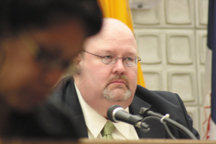Hoping to spark interest in a piece of property that has not been used up to its potential, the City Council will introduce an ordinance at its Dec. 15 meeting that would approve a redevelopment plan allowing a developer to build low-intensity commercial construction instead of apartments.
City Planner John Fussa said the property is currently zoned as R-3, which allows for residential apartments. But since no developers have offered to build on the site, the city is seeking to expand the uses in order to upgrade what is an important gateway section of the city.
“We’re concerned that if nothing is done, this site might become blighted,” Fussa said during a brief interview. “Since we’ve had no proposals for development, we are trying something that will be more flexible.”
“We’re concerned that if nothing is done, this site might become blighted.” – John Fussa
________
“The property has been vacant for a number of years,” Fussa said.
If the City Council votes to move ahead with the ordinance detailing the redevelopment plan as designed by the Bayonne Planning Board, the public will have an opportunity to speak on it at a public hearing scheduled for Jan. 19 at 7 p.m.
The City Council authorized the Planning Board to develop a plan for the site in October, although Fussa said no developer has yet expressed interest in the property.
New undercover police cars
The City Council is expected to approve the purchase of 14 non-police type vehicles for use in undercover work.
“The cars will be used cars and will be purchased without taxpayer based funds,” said Police Chief Robert Kubert. “They are being purchased with monies confiscated during criminal investigations, in which members of the Bayonne Police Department took part. During the ensuing legal process, the government moves to have the funds forfeited as being obtained illegally.”
Kubert said this happens when and if the presiding judge decides the monies were obtained illegally and subsequently orders their forfeiture. Each law enforcement agency that participated in the investigation, or seizure of the monies, is entitled to a percentage of the total forfeited funds.
“The funds can then only be utilized by each respective law enforcement agency and only for law enforcement purposes,” he said. “The purchase of unmarked vehicles for use in future investigations is one of the recommended uses. The process usually takes several years before it winds its way through the legal system to the final order of forfeiture. The last time we bought unmarked cars was in 2004, and we also used forfeited funds at that time to purchase used cars for undercover investigations.”
Tax appeal bond postponed until January
The City Council had hoped to pass a $2.29 million bond to cover pending tax appeals for the year 2010, but will have to put off the passage until January because it has to be approved by the state’s Division of Local Government, a board that will not meet again this year, said Council President Terrence Ruane.
The City Council will hold a public hearing at its Dec. 15 meeting on an ordinance that will appoint a Field Representative to supervise its zone managers, and to hire a principal city planner.
At the same meeting, the City Council will introduce an ordinance adding three titles to the city’s employment roles: a supervision parking enforcement officer, a parking enforcement officer, and a traffic control officer.
Another ordinance being introduced will alter the city’s residential parking program to allow any resident in the city to park in any other part of the city, instead of parking in particular zones as it is currently operated.
